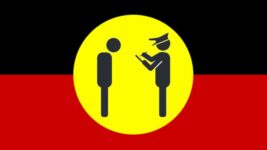Calls to Reform Flat-Rate Fining Regimes That Paralyse the Poor

The COVID-19 penalty infringement regime that’s prevailed nationwide since the pandemic onset has brought into stark relief the disparities involved in the practice of imposing flat-rate financial penalties across the entire population regardless of socioeconomic circumstances.
Hiking COVID infringement notices to draconian levels was seen to reflect the potential that the virus had to wreak havoc within the community and, therefore, it attempted to burden all sectors of society regardless of wage bracket.
But when remote predominantly First Nations towns of western NSW were descended on by police officers handing out $1,000 fines to less affluent locals, not only was this counterproductive to its immediate aims, but it’s sure to have an ongoing impact long into the future.
The situation in WA
Nowhere in the country have the problems of the blanket fining of the public been more pronounced than in WA, where, until recently, a person could be thrown into prison for unpaid fines, which resulted in large numbers of First Nations single mothers detained over relatively small debts.
Indeed, Ms Dhu died in custody due to the horrendous treatment she was subjected to inside. Yet, the 22-year-old Yamatji woman had called on police for assistance during a domestic violence incident, and on finding that she had outstanding fines, officers arrested her and took her in.
Long-term social justice advocate Gerry Georgatos initiated the campaign to see the abolition of the Western Australian gaol-for-fine-defaulters system in 2011. And the laws that brought it to an end were passed in mid-2020.
However, according to Georgatos, these reforms have not solved the wider issues associated with the all-inclusive flat-rate fining of the entire populace, which disproportionately impacts poorer sectors to the point that some individuals take their own lives as a means of escaping debt.

The campaign continues
“There is a discriminatory, classist struggle in this nation, where the unemployed, the underemployed, and the homeless can be decimated because they are too poor to pay fines,” Georgatos made clear.
“This crisis is particularly evident and sadly pernicious in West Australia,” the National Suicide Prevention and Trauma Recovery Project founder told Sydney Criminal Lawyers.
The reforms contained in the Fines, Penalties and Infringement Notices Enforcement Amendment Act 2020 (WA) came into effect in June last year. These saw restrictions placed on imprisoning people for non-payment of fines, so that now it must be court-ordered and a sanction of last resort.
Debtors can still be sent to prison, and, as Georgatos tells it, they continue to be. But the larger issue now is the imposition of such steep fines upon people from lower socioeconomic circumstances that it paralyses individuals who cannot afford to pay them.
The mental weight of these debts can often lead to depression, and, under the worst scenarios, it can result in suicide.
“Now that the gaoling of fine defaulters has been significantly reduced,” Georgatos continued, “we have commenced the second wave of the unpaid fines campaign – to make fines affordable and on an equal deterrent value basis.”
Settler colonial justice
Released in April 1991, the final report of the Royal Commission into Aboriginal Deaths in Custody recommended an amnesty on long outstanding fines, that non-custodial penalties for unpaid fines be the go-to sanctions and that those handing down sentences consider a debtor’s ability to pay.
“From a racialised lens”, Georgatos advised, WA “is the mother of all gaolers, arresting and incarcerating First Peoples at the world’s highest rates.” And he adds that prior to the reforms, half all-gaoled debtors in Western Australia were First Nations peoples.
The social justice campaigner outlined that prior to 2013, 1,100 impoverished West Australians were locked up over unpaid fines, half of whom were Aboriginal and Torres Strait Islander peoples. And this accounted for 18 percent of the state’s overall adult prisoner population.
So, while the immediate threat of prison over debts that can’t be paid has gone, the punishments now meted out, including driver licence disqualification, will continue to have a greater impact upon First Nations communities. And so too will the flat-rate fining system.
A sliding scale
“Greater numbers of West Australians living below the poverty line or in relative proximity to the poverty line, cannot afford to make payments,” Georgatos outlined. And he described a cycle that leads to a bad credit rating, followed by an inability to secure rental properties, even social housing.
“Those who make repayments sacrifice the urgent essentials of their families – less food on the table and less recreational activities for their children,” he continued. “Some steal to survive, are caught, incarcerated and families are torn apart.”
So, the reinvigorated reform campaign is calling for a European-style sliding-scale system.
However, it’s first point of call is in demanding that for people living below the poverty line, there should be an outright prohibition on fines, as this 20 percent of the population continues to bear the heaviest burden in terms of suicide and incarceration.
Georgatos further maintains that no fining model currently in place in this country is good enough. And if the nation wants “a genuine fine repayment plan which is equitable and does not discriminate and disadvantage”, then fines for the rest of the population “should be assessed relative to income”.
As they do it over in Scandinavia
Similar to their progressive reforms around prison rehabilitation and decarceration, it’s the Scandinavian countries that have implemented more equitable systems of monetary penalties that don’t result in the disproportionate penalisation of the poor.
Georgatos pointed to the system in Finland. The Finnish model sees an estimate made of the daily spending money an individual has at their disposal. And this amount is then halved, with the resulting outcome being the amount that a person should be fined when breaching the law.
From there, it is the severity of the crime that dictates how long an individual should be deprived of half their daily spend. For example, this could be 12 days for a minor speeding infringement, with 22 days applying for a major breach of the speed limit.
These sliding-scale fining systems also operate in Sweden, Demark, Germany, France, Austria and Switzerland.
“Proportional or sliding-scale fines retain the deterrent effect and are affordable, while not disadvantaging impoverished people to the point where they have no capacity to pay these fines,” Georgatos concluded.
“The social return will reduce crime. The social return will keep more families intact and children in school.”







